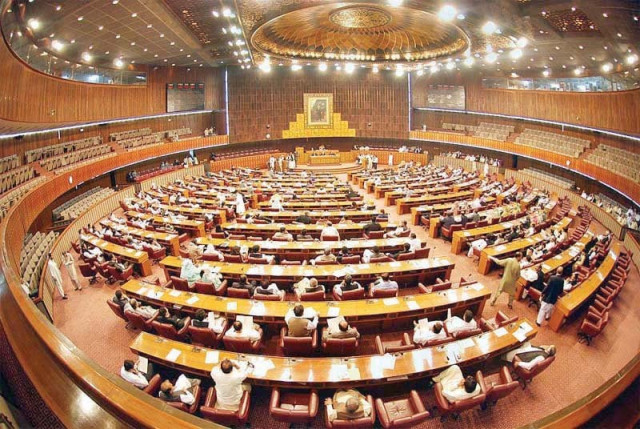FAFEN commends 15th NA’s resilience
Says the NA demonstrated legislative productivity surpassing that of its three predecessors

ISLAMABAD. The Free and Fair Election Network (Fafen) has said the 15th National Assembly of Pakistan—which was dissolved on August 9—showcased a notable resilience to withstand the pressures on its existence and supremacy, “wielding legislative productivity that surpassed its three predecessors”.
The NGO—dedicated to strengthening democracy through methodically-enacted observation and oversight of electoral, parliamentary, and governance processes—on Sunday issued an 11-page preliminary report on the performance of the 15th NA, presenting a number of interesting statistics.
According to the report, despite 11% fewer sittings, the legislative output of outgoing assembly grew by 57% to a total of 322 pieces of legislation as compared to the 14th NA, which had passed 205 bills.
The 13th assembly had passed 134 bills and 12th assembly only 51 bills during their respective terms.
“The generous approval of the private members’ bills also remained a hallmark of the outgoing assembly, exhibiting a collaborative spirit that steered the coalition government. More than 30% of the approved legislation (99 bills) was initiated by private members and the remaining by the government.”
Also Read: Kakar named interim PM in surprise pick
The legislative productivity was not the sole distinction of the 15th assembly that also saw a first-ever successful vote of no confidence against a prime minister, resulting in the change of government.
Previously, two prime ministers faced voting on resolutions of no-confidence against them including Benazir Bhutto in 1989 and Shaukat Aziz in 2006. Both of them were able to retain their majority in the Assembly.
Moreover, the outgoing assembly was the first since 1977 to be dissolved voluntarily by the Leader of the House before the completion of its term.
With the exception of 1993, when the assembly was dissolved through an agreement with the establishment leading to the resignation of both the president and prime minister, all other instances of preterm dissolutions were enforced via the presidential invocation of Article 58 (2)(b).
An analysis of the approved bills categorized by government reveals that a significant portion of the legislative activity (54%) occurred during the 16-month tenure of the PML-N-led coalition government. Meanwhile, the PTI government was responsible for the remaining 46% of the legislative agenda during its three-and-a-half-year rule.
Nearly one-third of the government legislation approved by the house during the PTI government’s term originated as presidential ordinances.
Of the government legislation, 200 bills were initiated by male ministers and 26 by female ministers. Among the private members’ bills passed by the house, 63 were initiated by male lawmakers and 29 by female lawmakers, while the remaining seven were jointly sponsored.
The assembly recorded 1,310 hours and 47 minutes of on-floor proceedings during its 52 sessions comprising 442 sittings in 687 working days.
The assembly proceedings, however, remained suspended for 122 hours 11 minutes due to various reasons such as lack of quorum, prayer breaks, etc.
Read also: Assembly session adjourned for lack of quorum
Approximately two-thirds of the assembly sittings (equivalent to 67%) and working hours (amounting to 63%) were completed during the PTI government's term, which ended on April 9, 2022.
The remaining one-third of the sittings, along with 37% of the total working hours, were conducted during the term of the PML-N-led coalition government.
Asad Qaiser presided over 40% of the proceedings himself during his term as the NA speaker. Deputy Speaker Qasim Suri chaired nearly 39% of the proceedings while members of the panel of chairpersons presided over the rest of 21% proceedings.
Speaker Raja Pervez Ashraf chaired 53% proceedings himself. His deputy, Zahid Akram Durrani, chaired 29% proceedings and members of the panel of chairpersons 19%.
Imran Khan attended 9% of the sittings while Shehbaz Sharif attended 17% sittings during their respective terms as premier. As Leader of the Opposition Shehbaz attended 27% sittings while Leader of the Opposition Raja Riaz attended 40% of the sittings during the time they held the office.
The lawmakers’ attendance showed a declining trend over the period of five years with annual average attendance falling from 250 (73%) legislators per sitting during the first year to 117 (34%) lawmakers per sitting during the last year.
The declining trend of attendance during the last two years can be attributed mainly to an en masse resignations of PTI lawmakers from the assembly.
“Seized with complex political, economic, judicial and constitutional challenges, the 15th NA showcased a notable resilience to withstand the pressures on its existence and supremacy before completing its [term], wielding legislative productivity that surpassed its three predecessors,” it said.



















COMMENTS
Comments are moderated and generally will be posted if they are on-topic and not abusive.
For more information, please see our Comments FAQ